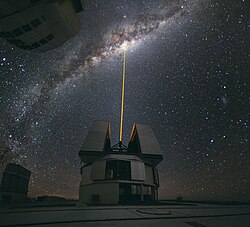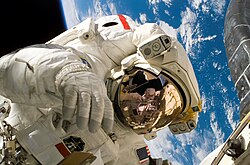Outline of space science
| Part of a series on |
| Science |
|---|
| General |
| Branches |
| In society |

The following outline is provided as an overview of and topical guide to space science:
Space science – study of everything in outer space.[1] This has sometimes been called astronomy, but recently astronomy has come to be regarded as a division of broader space science, which has grown to include other related fields,[2] such as studying issues related to space travel and space exploration (including space medicine), space archaeology[3] and science performed in outer space (see space research).
Branches of space science

- Astronomy
- Fields of astronomy defined by approach
- Observational astronomy – Observatories on the ground as well as space observatories take measurements of celestial entities and phenomena
- Astrometry – studies the position and movements of celestial objects
- Amateur astronomy
- Theoretical astronomy – mathematical modelling of celestial entities and phenomena
- Observational astronomy – Observatories on the ground as well as space observatories take measurements of celestial entities and phenomena
- Fields of astronomy defined by scope
- Astrophysics – study of the physics of the universe; of extraterrestrial objects and interstitial spaces
- Space plasma physics
- Orbital mechanics or astrodynamics, which also has applications to spacecraft
- Stellar astronomy – the study of stars
- Solar astronomy – the study of our Sun
- Planetary science – the study of planets, especially those other than Earth
- Galactic astronomy – the study of our Milky Way galaxy
- Extragalactic astronomy – the study of the larger universe beyond the Milky Way
- Physical cosmology – the study of the universe as a whole
- Astrophysics – study of the physics of the universe; of extraterrestrial objects and interstitial spaces
- Fields of astronomy defined by approach
- Aerospace engineering
Space-related interdisciplinary fields
- Astrobiology
- Astrochemistry or cosmochemistry
- Planetary science – overlaps with Earth science
- Micro-g environment research
- Forensic astronomy
- Space archaeology – the study of human artifacts in outer space
- Archaeoastronomy – the history of human understanding of the universe
Astronomy
See astronomical object for a list of specific types of entities which scientists study. See Earth's location in the universe for an orientation.
Space exploration
Astronautics
Astronautics – science and engineering of spacefaring and spaceflight, a subset of Aerospace engineering (which includes atmospheric flight)
- Life in space
- Living organisms in space
- Humans in space
- Animals in space
- Dogs in space
- Monkeys and apes in space
- Microorganisms tested in outer space
- Plants in space
- Space habitation
- Human spaceflight
- Living organisms in space
See also

- Outline of aerospace
- Space Sciences Laboratory – University of California, Berkeley
- Space exploration – includes scientific investigations through manned spaceflight and space probes
- Space colonization
- Commercialization of space
- Space warfare
- Asteroid-impact avoidance
- Space law
- Remote sensing
- Planetarium – A synthetic observatory, used for education and presentations
- Centennial Challenges NASA prize contests
- Exploration of Mars
- Human spaceflight
- Space exploration
- Space architecture
- Space colonization
- Space industry
- Space industry of Russia
- Timeline of artificial satellites and space probes
- Batteries in space
- Control engineering
- Corrosion in space
- Industry in space
- Nuclear power in space
- Observatories in space
- Orbital mechanics
- Robotics
- Space environment – study of conditions that affect the operation of spacecraft
- Space logistics
- Space technology
References
External links
- Institute of Space Technology, Pakistan
- Space Sciences @ NASA
- Space Sciences @ ESA
- INDIAN INSTITUTE OF SPACE SCIENCE AND TECHNOLOGY
- Space Sciences Institute
- Space Science & Technology, (Persian) an Iranian nongovernmental group who writes scientific articles about Space Science & Technology

